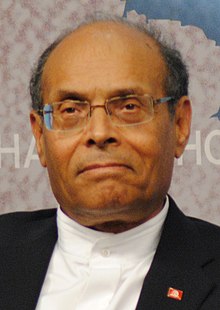Moncef Marzouki
| Moncef Marzouki المنصف المرزوقي |
|
|---|---|
 |
|
| 4th President of Tunisia | |
|
In office 13 December 2011 – 31 December 2014 |
|
| Prime Minister |
Béji Caïd Essebsi Hamadi Jebali Ali Laarayedh Mehdi Jomaa |
| Preceded by | Zine El Abidine Ben Ali |
| Succeeded by | Beji Caid Essebsi |
| Member of the Constituent Assembly for Nabeul's 2nd district |
|
|
In office 22 November 2011 – 13 December 2011 |
|
| Preceded by | Constituency established |
| Succeeded by | Samia Abbou |
| President of the Congress for the Republic | |
|
In office 24 July 2001 – 13 December 2011 |
|
| Preceded by | Position established |
| Succeeded by | Abderraouf Ayadi (Acting) |
| President of the Tunisian Human Rights League | |
|
In office 12 March 1989 – 5 February 1994 |
|
| Preceded by | Mohamed Charfi |
| Succeeded by | Taoufik Bouderbala |
| Personal details | |
| Born |
7 July 1945 Grombalia, Tunisia |
| Political party | Congress for the Republic then Al-Irada |
| Spouse(s) | Beatrix Rhein |
| Children | 2 |
| Alma mater | University of Strasbourg |
| Website | Official website |
Mohamed Moncef Marzouki (Arabic: محمد المنصف المرزوقي; Muhammad al-Munṣif al-Marzūqī, born 7 July 1945) is a Tunisian politician who was President of Tunisia from 2011 to 2014. Through his career he has been a human rights activist, physician and politician. On 12 December 2011, he was elected as President of Tunisia by the Constituent Assembly.
Born in Grombalia, Tunisia, Marzouki was the son of a Qadi. His father, being a supporter of Salah Ben Youssef (Bourguiba's opponent), emigrated to Morocco in the late 1950s because of political pressures. Marzouki finished his secondary education in Tangier, where he obtained the Baccalauréat in 1961. He then went to study medicine at the University of Strasbourg in France. Returning to Tunisia in 1979, he founded the Center for Community Medicine in Sousse and the African Network for Prevention of Child Abuse, also joining Tunisian League for Human Rights. In his youth, he had travelled to India to study Mahatma Gandhi's non-violent resistance. Later, he also travelled to South Africa to study its transition from apartheid.
When the government cracked down violently on the Islamist Ennahda Movement in 1991, Marzouki confronted Tunisian President Ben Ali calling on him to adhere to the law. In 1993, Marzouki was a founding member of the National Committee for the Defense of Prisoners of Conscience, but he resigned after it was taken over by supporters of the government. He was arrested on several occasions on charges relating to the propagation of false news and working with banned Islamist groups. He subsequently founded the National Committee for Liberties. He became President of the Arab Commission for Human Rights and as of 17 January 2011[ref] continues as a member of its Executive Board.
...
Wikipedia
